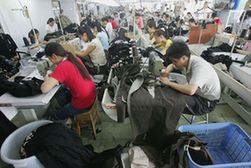By He Shan
China.org.cn staff reporter
|

|
|
Crew are busy making clothes at sartorius in a textile factory of Dongguan, a traditional engine of China's phenomenal economic growth. |
A crowd of people pack a meeting room for job interviews in Hsu Fu Chi, a food company in southern China's Dongguan, a scene that is ever more common as the slowing economy causes factories to cut back on production and work force.
Dongguan, a power house of China's astounding economic growth over the past two decades, has faced extraordinary challenges rising both from the need to upgrade industry and from shrinking orders in overseas markets.
The recession of the world's major economies has dealt a heavy blow to the city. Dongguan posted a negative growth of 2.5 percent in GDP in the first quarter this year, the lowest level in the past two decades.
As a vanguard of China's economic growth, Dongguan was catapulted from a small agricultural town to an export center of 7 million people in a little over 20 years. It accounts for a large bulk of China's exports, making it especially vulnerable to overseas economic circumstances.
Its heavy reliance on exports is now inflicting real pain here. With markets in the United States, Europe and Japan drying up, the local government is trying to reverse what had been an ever-growing dependence on exports. Much is being done to shift the economy away from a heavy reliance on exports by tapping the domestic market.
Hsu Fu Chi, a company founded by Taiwanese, has reason to be upbeat because its business has suffered little in the economic downturn.
"Since we started doing business in the mainland, we have focused on the domestic market, so the effect is not so great as on other export-driven companies," said Sun Tianzhen, a director of the marketing department of Hsu Fu Chi. "Our strategy has helped to insulate the company from losses in a weak economy."
At the same time, the local government has seized the chance to use the downturn to put China on a cleaner growth path to make the economy more sustainable and healthier.
Before the financial crisis hit the city, the local government had begun encouraging energy-exhaustive industries further inland to bring in greener, high-tech enterprises.
As the financial crisis deepens, the local government is under pressure to soak up rising numbers of jobless migrants, but it is still determined to move production to a higher level that requires more skilled workers.
At the same time, some companies are poised to shed basic manufacturing to concentrate on higher-value activities. And some companies are already thinking of moving some non-core, labor-intensive operations to other lower-cost locations further inland, as labor and land costs rise here.
Yet, some are determined to stay, because Dongguan has unmatched advantages that other cities lack. The main thrust of its advantages lies in its complete supply chains which help to drive down transport and other costs.
Kyocera Mita Office Equipment (Dongguan), although its orders have fallen 30 percent since the end of last year, is among the companies that have chosen to stay. It can purchase the components and devices it needs to manufacture its printers from suppliers next door or around the corner, because upstream and downstream companies cluster here.
"Dongguan is definitely not the lowest-cost place in China, but it's a very attractive place from an engineering and product development standpoint," said Ueda Masaru, director and general manager of Kyocera.
"Moreover, the local government is always ready to help us when we encounter difficulties," he added.
(China.org.cn, April 29, 2009)